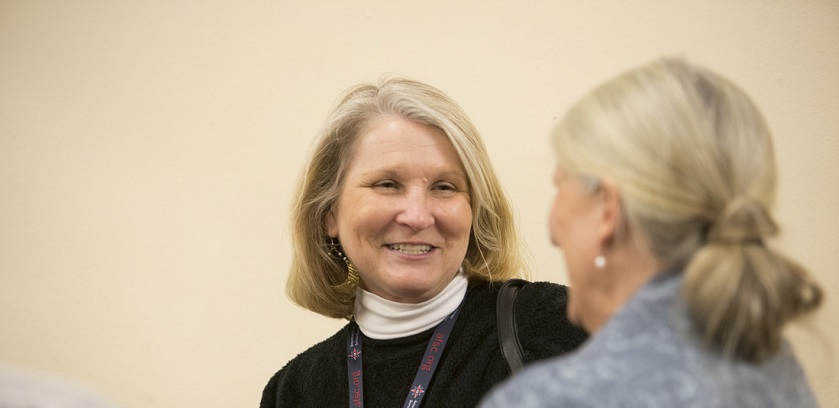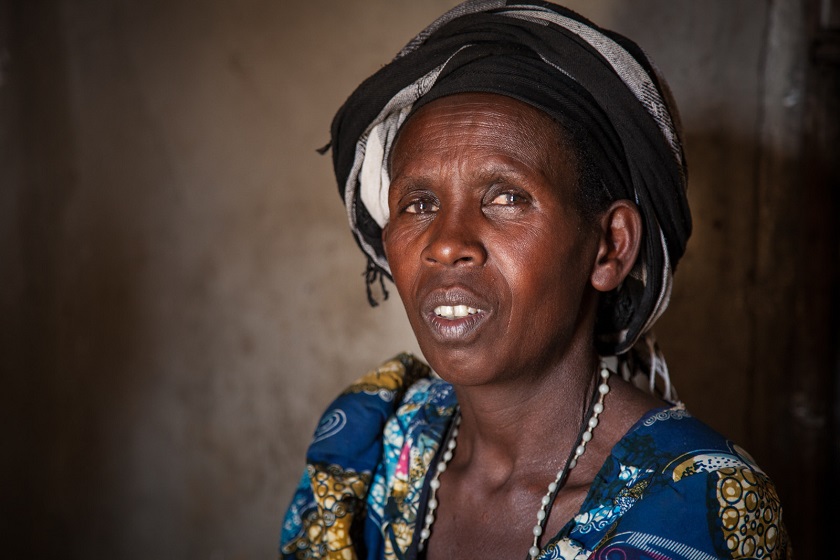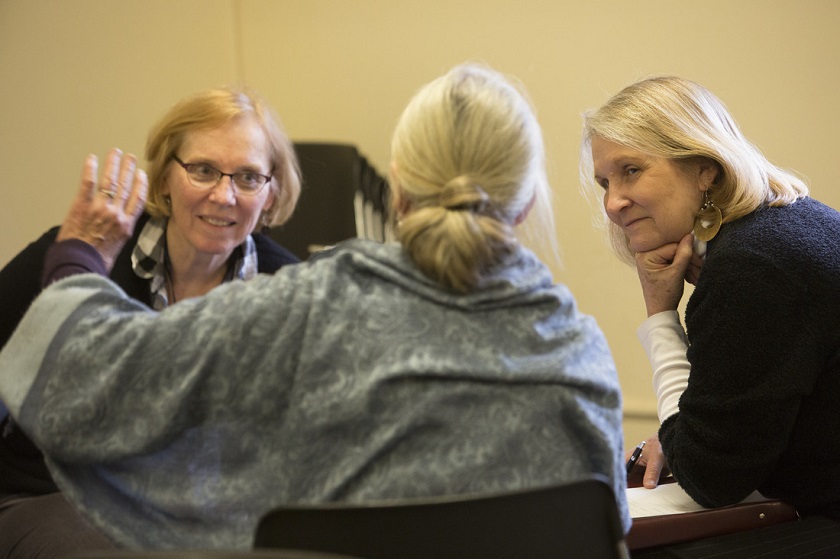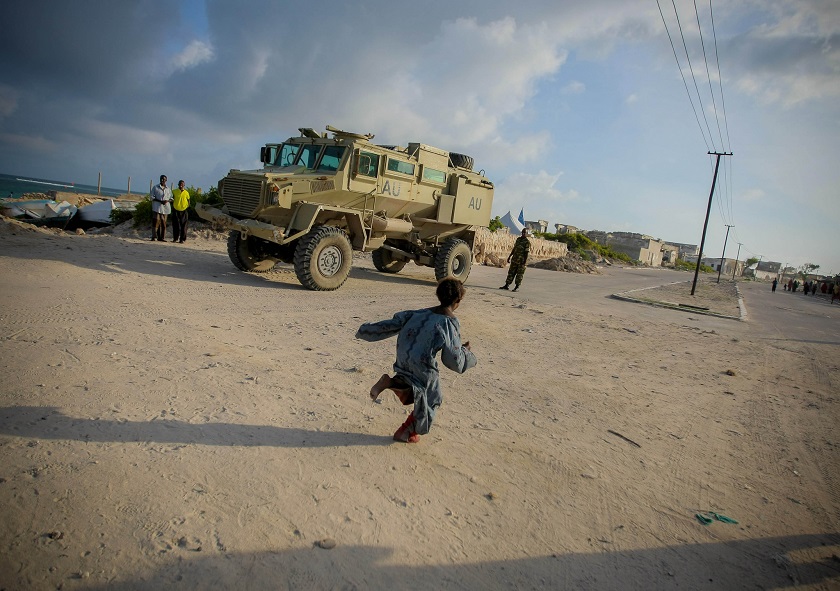
Pam Ferguson at the 2016 AFSC Corporation Meeting James Wasserman / AFSC
Pam and Ron Ferguson were invited to lead programmed worship at AFSC's Annual Corporation meeting on March 5, 2016. Pam and Ron are the Co-Pastors of Winchester Friends Church in Winchester, IN, where they live out Friends' Testimonies with their church community through work in local food pantries, an active Peace and Social Concerns Committee, and Friends Council on National Legislation (FCNL), among many other activities. Here is Part I of their sermon delivered by Pam. Part II can be found here.
Years ago, when Ron and I were young and naïve, we sold everything we owned and flew off to Africa. We landed in Southern Sudan in the middle of a civil war and worked with refugees from another war in Uganda. Motivations for changing our lives at the ripe old age of 30 were many. One was, we thought we could help change the problems Africa faced. Instead, Africa changed us. After nine years in Southern Sudan and Uganda our African friends taught us our Quaker testimonies of simplicity, peace, integrity, community and equality are not just good things to believe in, or just something we do, but our testimonies must define how we live. We must be these testimonies to our world.
A petite Ugandan woman named Susan Ubima taught me about being peace in our world. I met her shortly after Northern Ugandan rebels killed her husband in an ambush. I admired her grace in the face of tragedy. Several years after the death of her husband, Susan was traveling on the same road where he was killed, when rebels attacked her bus. In the rain of bullets, many on the bus died and Susan was shot in the arm and a bullet grazed her scalp. She and several other survivors managed to crawl out of the bus and were taken hostage by a large group of rebels, most of them barely teenagers.

Susan knew what she faced—possible death at the hands of men who killed her husband, or being forced into being a sex slave to this group of rebels. For six hours Susan and the captives were marched deep into the Ugandan bush where they witnessed the murder of one of the captives who tried to escape. In those hours facing the unknown, Susan felt a leading to pray for the young men guarding her. Many of the rebels were close to the same age as her teenage son and she began to engage them in conversation, to reach out to them, as she knew their mothers would want her to do. Slowly they began to respond to Susan. They talked a bit about playing soccer, about their homes and their families. She watched as their demeanor changed; they began to look her in the eye and spoke to her in kinder tones. Suddenly and unexpectedly, the rebels released Susan and the other hostages and they walked back to safety.
When Susan told us her story several days after the capture, she spoke about the peace studies she and her husband did under the tutelage of Quaker Peace and Service volunteers years before. The inner work of preparing for peace gave her a foundation to stand on when she found herself face to face with her husband’s killers. In moments when she feared for life, she was drawn to look for that of God in her captors instead of seeing them only as rebels and killers. She was in the process of traveling a path towards forgiveness when this incident happened. She knew in those moments that somehow, someway the cycle of violence, revenge, and killing had to stop and she could choose to be a part of that plan through forgiveness and mercy. When her own children responded with hate towards the rebels for killing their father and almost killing their mother, Susan’s witness of forgiveness and mercy and her commitment to peace slowly changed their lives. I wish I could tell you Susan’s witness changed Uganda and a rebel movement based on class, ethnic differences and religion. It didn’t. It did change Susan’s children and stopped the cycle of revenge and hatred for them.

Susan’s witness changed me and prepared me for life back in America. After years in the war zones of Africa, we moved to a safe home in the middle of rural America where there were no landmines or civil wars. On a spring afternoon, a prisoner from the county jail a block from our home beat up a guard, escaped, ran down the alley, found our back door, and broke into our home. I was home alone and found myself face to face with an angry, violent and broken young man. I was held hostage for 20 minutes while policemen searched our neighborhood in vain for this escaped prisoner.
In those moments, my commitment to peace made a difference. Because I knew I did not want to harm this young man, I was able to respond calmly to him. My husband and my own commitment to peace meant we owned no guns. He searched our home for a weapon to use against me and the policemen outside my home. He found nothing. In the moments alone with this young man in our home, he broke down and cried on my shoulder, he told me about his children for whom he broke out of jail to see—and about the 20 year sentence he’d just received. I was able to give him a cup of cold water and told him I was praying for him. In the end, he still tied me up and stole our car. But the few scrapes and bruises I had were incredibly minor to what this encounter could have been.
Face to face with this young man in my home, I did not know how things would turn out. But I discovered I did not fear harm or death. God’s presence was tangible and real and I faced the unknown with peace and confidence that God would help me through whatever was to happen. My relationship with God does not mean I’m protected from pain, suffering, or death. Susan’s husband, school children across our nation, and many men, women and children who are the victims of violence and war in our world each day remind us few escape violent encounters unscathed. How we respond in the face of violence matters. The same peace we profess in our lives and in our faith communities must be the same peace we have in the face of violence and death. The same presence of God we profess must be the same presence we seek in the lives of every person we face.

I would like to say the encounter with this young man in my home changed his life. Within weeks of the encounter I wrote to him in jail and offered forgiveness and reconciliation. I spent 10 years writing, praying, supporting, and encouraging this young man in his efforts to educate himself, his efforts to be a father in prison, his hope and plans for restoration and a changed life outside of prison. Within two months of his release, he was rearrested for stealing cars and driving them through the back doors of pharmacies to steal drugs.
We live in a broken, hurting and unjust world. The stories of broken lives rarely change.
We lived a few hours down the road from Rwanda during the 1994 genocide and witnessed the horror of people’s inhumanity to neighbors, friends and families. Every day we woke up with a passion to do anything and everything with hope something might work to end the horror and violence and to find a way to change the world.
That is still my passion, but there are some things in my life that won’t change: my commitment to be the presence of God to this world, to remain faithful to my Quaker testimonies, to be hope in the face of hopelessness, to feed the hungry and visit the imprisoned regardless of the outcome.
Lord, keep me faithful.
Related content:
The Third Reconstruction: Moral fusion politics & working for justice
Podcast: Bayard Rustin and the March
Letter from a Birmingham City Jail: What would King say today?